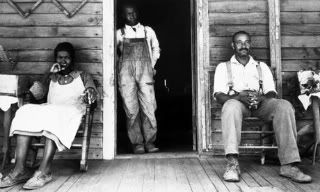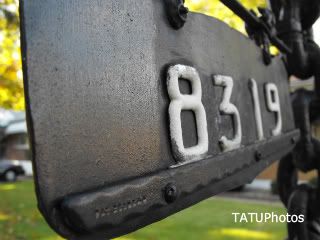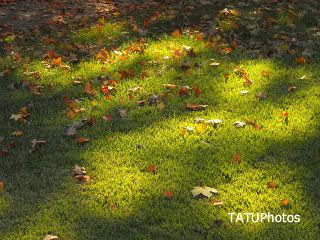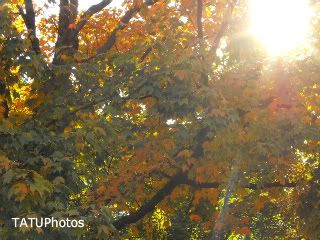


One of the nicest things about spending Saturday afternoons with my great-aunt was getting to hear to about the family history. She was sister to my father's mom, and one of seven siblings, as previously mentioned. I knew the big stories, but got to hear so many smaller ones that proved to be hardly insignificant.
The most famous one was about her brother Harold, who served in WWII. He was chased across a field by German soldiers and crashed his Jeep in a ravine, being thrown from it in the process. He played possum as they went over to check that he was dead, and stabbed him in the leg to make completely sure. He laid as still as a dead man, and survived it. He went on to earn five Bronze Stars and died thirty years later.
The one she loved to laugh about the most was when my grandmother was pregnant with my father, and the women were busy crocheting little clothes for him to wear. My great-aunt was the least crafty of them all, and one evening her mother, Ruby, gathered the sisters to inspect their handiwork. My grandmother's was fine; Ginny's was fine; then she got to my great-aunt and was appalled. It was a little shirt, or supposed to be, but the armholes were so small, "you'll break the baby's arms trying to get them in it!"
When the family moved to this city, they lived near the downtown area in a cold-water flat. They had the usual early-twentieth-century amenities: an icebox, a coal stove, general lack of air-conditioning. They used oil lamps for much of their light. And though poor, they were not kept from observing holidays as we Americans are so very fond of: with lots of food. They would cook a big meal the day of, and have plenty left over for the next day, and for any neighbors who came by.
On cold winter mornings, her father, Henry, would get up early to start the heat in the stove so that Ruby would get out of bed no less than warm and toasty, and he would rouse the kids and cook a pile of flapjacks for breakfast. One year, they had so little money at Christmastime that there was nothing for gifts. But my grandmother, the youngest, still believed in Santa Claus and just knew he would bring her a tiny little couch to complete her small play furniture set. So Henry dug very, very deep, and very likely did without something he needed, and come Christmas morning, Hazel had that little couch.
There was a mean girl in the neighborhood who was bent on revealing to Hazel that there was no Santa Claus. She was almost as mean as Aunt Ginny. I can just imagine the tidal forces colliding when Ginny grabbed her by the shirt and snarled, "You tell her there ain't no Santa and I will hurt you somethin' fierce..."
There were only six kids in that cold-water flat, you know. The eldest sibling actually died shortly after he was born. I didn't know that until last year.
So those six kids grew up, had boyfriends and girlfriends, held jobs, joined the military, got married...but, as my great-aunt told it, as long as they were in the city, it didn't matter what plans they had for New Year's Eve--they, every one of them, still showed up on Mama and Daddy's doorstep at midnight to say a prayer with the family for the new year.
My great-aunt claims she didn't know how to so much as boil a pot of water when she was a young woman, and that Ginny moved into the same apartment building as she to teach her how to cook. (It worked: the woman was making full meals from scratch up until maybe two months before she passed away) She then moved to Chicago for quite few years; I don't know the exact time-frame, but it was after the death of her husband (he died in 1944) and before the sixties. She first lived in a residential hotel called the S&S with a bunch of other young twentysomething women, and they worked their jobs and courted their men, and often gathered in early evenings in the hotel parlor to play cards and listen to music on the radio. This, she told me just one week before the last time we ever spoke.
I knew her parents lived in Kentucky when she was small, but not that they actually were from Arkansas, and that she remembered the names of the men her father worked for (as poverty was kind of the norm back then). She even told me once the names of her mother's parents--I believe the father's name was Herman, because I remember thinking it's just a terrible name for a man to be shackled with; but the mother's name was Circe. How beautiful!
As someone who has been discovering a love affair with early twenieth century life, I just think it's pretty cool that I got to learn so much from an authentic source, and that it was all about people who mattered to me, too. The next time I get a chance to go to her house, I'm going to grab that photo album with those awesome old pictures and get copies made. They're even better than the ones I ganked for this post. :-)
(photos courtesy of www.phsc.ca, www.guardian.co.uk, www.waynoka.org)




